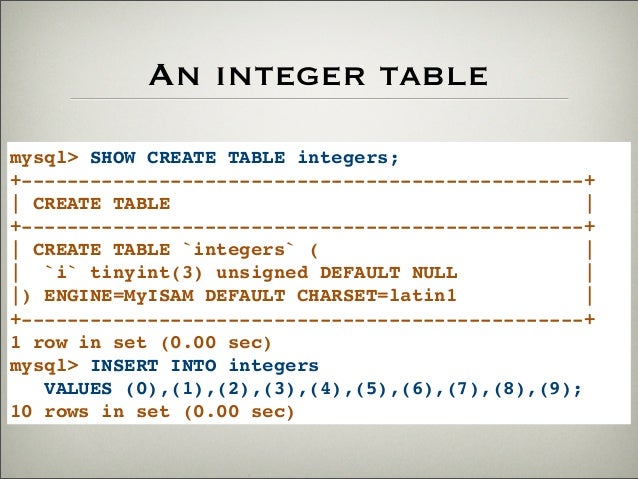Auto Generate Primary Key Mysql
Keytool wraps the public key in an X.509 v1 self-signed certificate. Although you must specify this information when you generate a public-private key pair with keytool, this certificate is not used by Host On-Demand or the SSH server during SSH client authentication using a public key. Keytool generate certificate from private key.
- Mysql Primary Key Syntax
- Auto Generate Primary Key Mysql File
- Reset Auto Increment Primary Key Mysql
- Auto Generate Primary Key Mysql File
It automatically generates an integer number (1, 2, 3, and so forth) when a new record is inserted into the table. A column like this is a good candidate for surrogate key column which acts as a primary key in the table. To create the auto number in MySQL, set the AUTOINCREMENT attribute to a column. The JPA specification supports 4 different primary key generation strategies which generate the primary key values programmatically or use database features, like auto-incremented columns or sequences. The only thing you have to do is to add the @GeneratedValue annotation to your primary key attribute and choose a generation strategy.
- Related Questions & Answers
- Selected Reading
MySQL has the AUTO_INCREMENT keyword to perform auto-increment. The starting value for AUTO_INCREMENT is 1, which is the default. It will get increment by 1 for each new record.
To get the next auto increment id in MySQL, we can use the function last_insert_id() from MySQL or auto_increment with SELECT.
Creating a table, with “id” as auto-increment.
Inserting records into the table.

To display all the records.
The following is the output.
We have inserted 3 records above. Therefore, the next id must be 4.
The following is the syntax to know the next id.
The following is the query.
Here is the output that displays the next auto-increment.
What is auto increment?
Mysql Primary Key Syntax
Auto Increment is a function that operates on numeric data types. It automatically generates sequential numeric values every time that a record is inserted into a table for a field defined as auto increment.
When use auto increment?
In the lesson on database normalization, we looked at how data can be stored with minimal redundancy, by storing data into many small tables ,related to each other using primary and foreign keys.
A primary key must be unique as it uniquely identifies a row in a database. But, how can we ensure that the primary key is always unique? One of the possible solutions would be, to use a formula to generate the primary key, which checks for existence of the key, in the table, before adding data. This may work well but as you can see the approach is complex and not foolproof. In order to avoid such complexity and to ensure that the primary key is always unique, we can use MySQL's Auto increment feature to generate primary keys. Auto increment is used with the INT data type. The INT data type supports both signed and unsigned values. Unsigned data types can only contain positive numbers. As a best practice, it is recommended to define the unsigned constraint on the auto increment primary key.
Auto Generate Primary Key Mysql File
Auto increment syntax
Let's now look at the script used to create the movie categories table.
Notice the 'AUTO_INCREMENT' on the category_id field. This causes the category Id to be automatically generated every time a new row is inserted into the table. It is not supplied when inserting data into the table, MySQL generates it.
By default, the starting value for AUTO_INCREMENT is 1, and it will increment by 1 for each new record
Let's examine the current contents of the categories table.
Executing the above script in MySQL workbench against the myflixdb gives us the following results.
Let's now insert a new category into the categories table .
Executing the above script against the myflixdb in MySQL workbench gives us the following results shown below.
Note we didn't supply the category id. MySQL automatically generated it for us because the category id is defined as auto increment.
If you want to get the last insert id that was generated by MySQL, you can use the LAST_INSERT_ID function to do that. The script shown below gets the last id that was generated.
Executing the above script gives the last Auto increment number generated by the INSERT query. The results are shown below.
Reset Auto Increment Primary Key Mysql
Summary
Auto Generate Primary Key Mysql File
- Auto increment attribute when specified on a column with a numeric data types, generates numbers sequentially whenever a new row is added into the database.
- The Auto increment is commonly used to generate primary keys.
- The defined data type on the Auto increment should be large enough to accommodate many records. Defining TINYINT as the data type for an auto increment field limits the number of records that can be added to the table to 255 only since any values beyond that would not be accepted by the TINYINT data type.
- It is considered a good practice to specify the unsigned constraint on auto increment primary keys to avoid having negative numbers.
- When a row is deleted from a table, its auto incremented id is not re-used. MySQL continues generating new numbers sequentially.
- By default, the starting value for AUTO_INCREMENT is 1, and it will increment by 1 for each new record
- To let AUTO_INCREMENT sequence start with another value , use AUTO_INCREMENT = 10